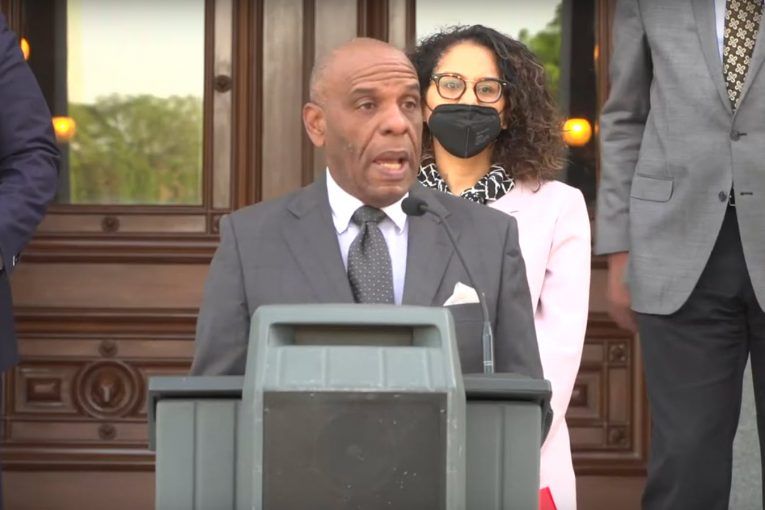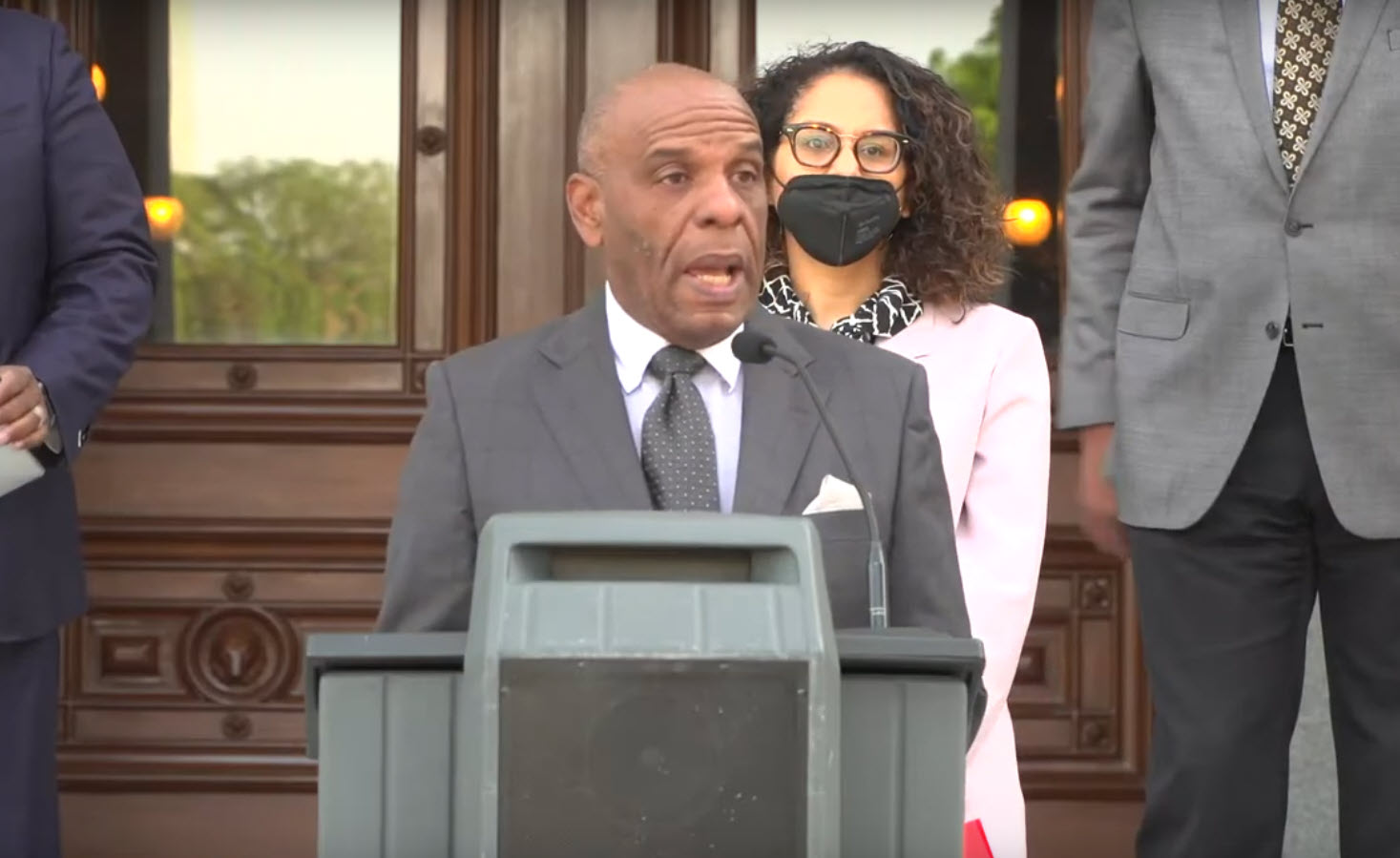

By Alexa Kendell and Natalia Claburn
SACRAMENTO, CA – California is considering passing the “SB #2” law to prevent law enforcement officers fired for misconduct from being rehired by another agency, and also eliminate absolute immunity for officers who wrongfully frame prisoners through illegal means.
In an interview discussing the mission behind passing California’s SB #2 law, a representative of the Player’s Coalition explained that the law aims “to help prevent officers who have been fired for misconduct from one police department, from having the opportunity to find employment with another, uh, law enforcement law enforcement agency and the same state.”
This bill is being sponsored by many key justice organizations such as the ACLU, Black Lives Matter, and other social justice groups that advocate for holding police officers who have committed misconduct accountable.
Senator Steven Bradford, the author of this bill, explained the process that would take place if a law enforcement officer were to be fired for misconduct.
The first step would be to identify and define what severe misconduct looks like. In the past, conduct review boards have been known to vote in favor of the law enforcement officers, which is why this bill would allow for civilian advisory boards to “adopt or reject that recommendation of whether officers should be decertified.”
This board would be made up of two law enforcement officers and nine people from academia, allowing for police officers to be represented but the “majority being non-sworn individuals.”
Bradford said, “1300 incidents [of police misconduct] in the last two years, for only 13 officers that [were] brought up on charges and only one was convicted.”
Bradford also noted the measure “protects good officers more so than anybody else,” with the goal of protecting civilians by holding law enforcement accountable for unjust actions.
Anne Irwin, the founder and director of Smart Justice California continued on Bradford’s point, recalling that last summer during a devastating wave of the COVID-19 pandemic, there were Black Lives Matter protests after the murder of George Floyd by ex-police officer Derek Chauvin.
Irwin said that at that time Sacramento was shut down because of the pandemic, unintentionally silencing the voices of the people while law enforcement officers were “able to call the cell phones of legislators and (tell them) all of the reasons that this was a bad bill.”
Natasha Minsker, an attorney and social justice advocate, further elaborated on how law enforcement is objecting to this bill. The police union’s main objection is with the membership of the advisory board, the individuals who would help in the process of decertifying police officers accused of misconduct.
However, Minsker explained that there are five steps that must be executed before an officer can be decertified.
The first begins with the police department’s initial investigation. Then it goes to the state agency called the post, which is run by law enforcement. Next is the advisory board which is the only step where the people’s voices can be heard. The investigation then goes back to the post and finally ends if there is an appeal to an administrative law judge.
Minsker highlighted that “the law enforcement dominated commission makes the final decision” as to whether the officer in question will be decertified.
But, if SB #2 bill is passed, this seemingly biased process will have more representation on behalf of the people.
Minsker was then asked to explain the doctrine of qualified immunity to the audience and why it is no longer in the bill.
She began by stating that this specific doctrine is one that “is not a policy that was created by the legislature in California, or even Congress. It’s an invention of the courts that is motivated by this desire to project law enforcement and other government officials from mitigation.”
As stated by Minsker, the doctrine of qualified immunity is meant to protect government officials from lawsuits by shielding them from being held liable for crimes committing on the job. The idea of having qualified immunity has been frequently debated within police reform.
Minsker argues that qualified immunity allows police officers to commit heinous crimes that should not be excusable merely through the doctrine of qualified immunity.
“We have a situation where, because of qualified immunity, people have lost loved ones to police violence … [but] you still have the court saying we’re not going to allow this family to seek justice in the courts because of the doctrine of qualified immunity, because the conduct was frankly, not extreme enough,” she said.
She adds that, although removing or changing qualified immunity should be in the bill, “because of the legislative process and the opposition from the law enforcement unions and the strength of those unions, that part of the bill had to come out through the amendment process.”
The bill, however, will still be addressing immunity in that it would remove the doctrine of absolute immunity, which is the rule that no matter how extreme the police officer behaves, whether it’s murder or planting evidence, you cannot sue them. SB #2 addresses this issue and removes these absolute immunities in California law.
This bill also addresses the argument coming from police officers that they need this immunity to “protect themselves against a flood of lawsuits.”
Irwin explained that officers will not be held personally liable if they commit a crime, rather the jurisdiction will be held civilly liable. Irwin stated that if police officers are held civilly liable, it will affect the jurisdiction, which will then realize they cannot afford to continue to make these mistakes. Therefore, this will cause a real culture change by creating a personal incentive.
Those who experience police violence will be given other ways to receive financial assistance that does not include going through the court system, such as the creation of the California Victims Compensation Board.
This board would provide compensation for victims and their families. Senator Bradford added that financial compensation is helpful, but it will not bring loved ones back. Therefore, the focus of this bill is to reduce police violence before it occurs, rather than simply dealing with the aftermath.
Bradford was then asked what the plan was moving forward, to which he replied that the next step is appropriations, and, “We’re asking folks now to call every member of the appropriations committee and stress how important this bill is.”
With the bill needing 41 votes to pass, Senator Bradford stressed the importance of encouraging people to reach out to their elected officials and tell their assembly members to vote yes on the bill, adding people should specifically reach out to the officials claiming to be progressive Democrats, because “we’ve got 60 Democrats … we shouldn’t be struggling to get 41 [votes].”

